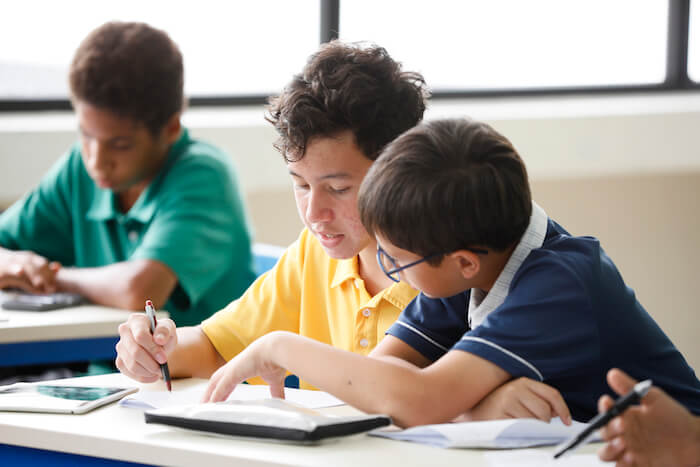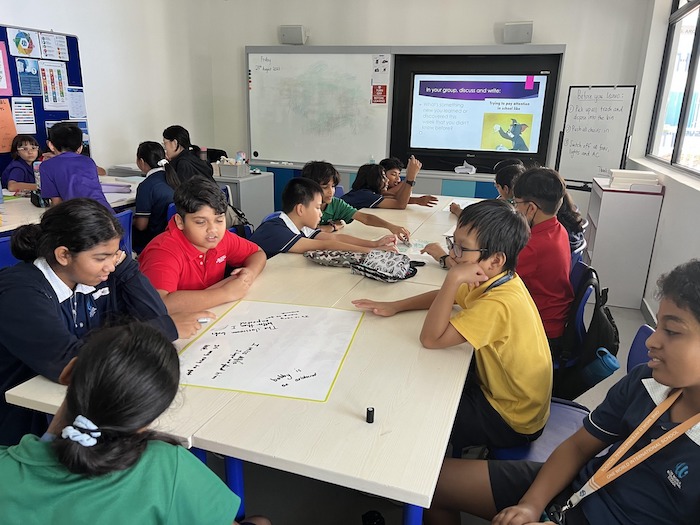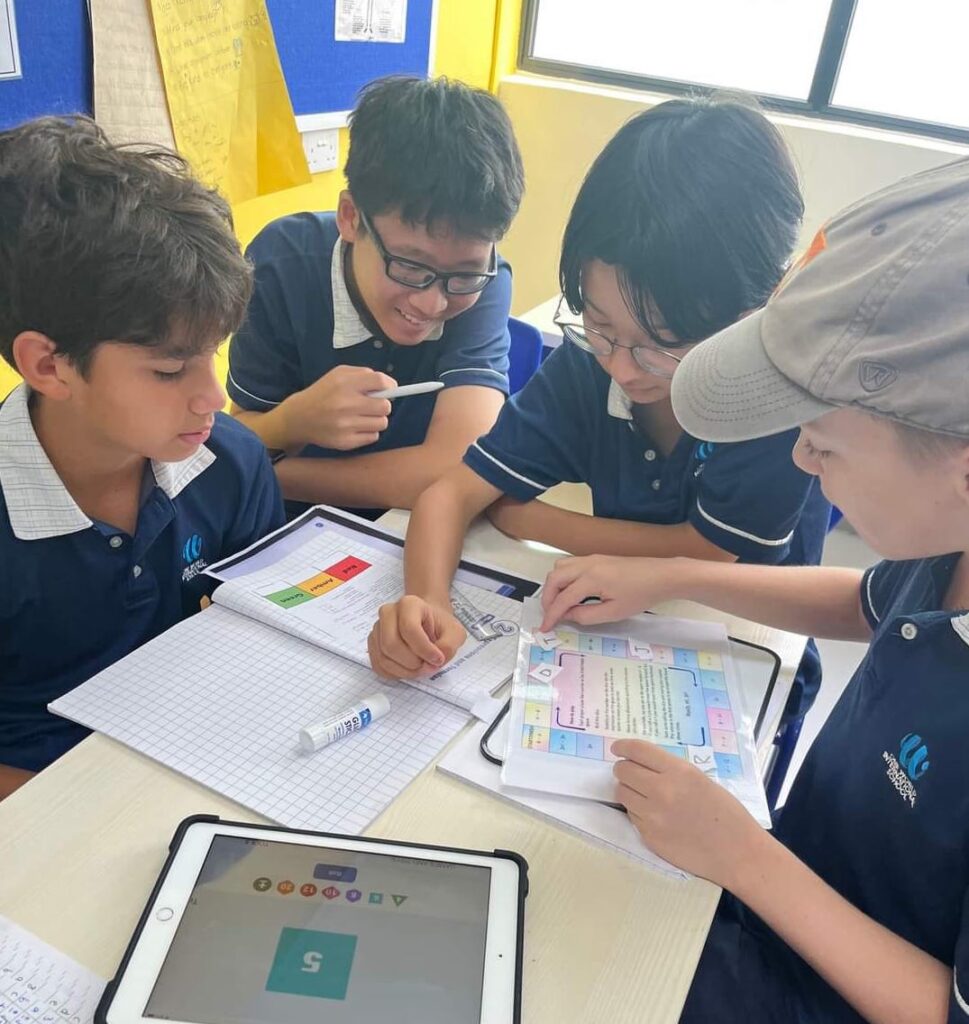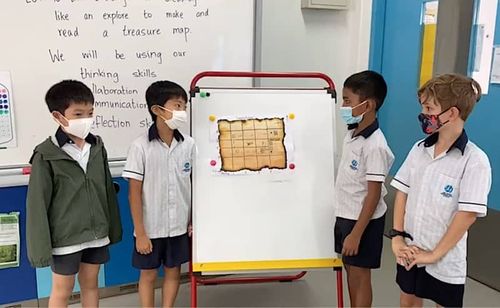Students need the freedom to brainstorm, develop solutions and make mistakes — this is truly the only way to prepare them for life outside the classroom. When students are immersed in a learning environment that only offers them step-by-step guides and encourages them to focus solely on memorisation, they are not gaining the skills necessary to help them navigate in the complex, interconnected environment of the real world.
Choosing a school that emphasises the importance of future-focussed skills will ensure your child has the abilities they need to survive and thrive anywhere in the world. What are future-focussed skills? Students who are prepared for the future need to possess highly developed communication skills, self-management skills, research skills, thinking skills, social skills and problem-solving skills. In this blog, I would like to focus on problem-solving skills.
What Are Problem-Solving Skills?
The Forage defines problem-solving skills as those that allow an individual to identify a problem, come up with solutions, analyse the options and collaborate to find the best solution for the issue.
Importance of Problem-Solving in the Classroom Setting
Learning how to solve problems effectively and positively is a crucial part of child development. When children are allowed to solve problems in a classroom setting, they can test those skills in a safe and nurturing environment. Generally, when they face age-appropriate issues, they can begin building those skills in a healthy and positive manner.
Without exposure to challenging situations and scenarios, children will not be equipped with the foundational problem-solving skills needed to tackle complex issues in the real world. Experts predict that problem-solving skills will eventually be more sought after in job applicants than hard skills related to that specific profession. Students must be given opportunities in school to resolve conflicts, address complex problems and come up with their own solutions in order to develop these skills.
Benefits of Problem-Solving Skills for Students

Learning how to solve problems offers students many advantages, such as:
Improving Academic Results
When students have a well-developed set of problem-solving skills, they are often better critical and analytical thinkers as well. They are able to effectively use these 21st-century skills when completing their coursework, allowing them to become more successful in all academic areas. By prioritising problem-solving strategies in the classroom, teachers often find that academic performance improves.
Developing Confidence
Giving students the freedom to solve problems and create their own solutions is essentially permitting them to make their own choices. This sense of independence — and the natural resilience that comes with it — allows students to become confident learners who aren’t intimidated by new or challenging situations. Ultimately, this prepares them to take on more complex challenges in the future, both on a professional and social level.
Preparing Students for Real-World Challenges
The challenges we are facing today are only growing more complex, and by the time students have graduated, they are going to be facing issues that we may not even have imagined. By arming them with real-world problem-solving experience, they will not feel intimidated or stifled by those challenges; they will be excited and ready to address them. They will know how to discuss their ideas with others, respect various perspectives and collaborate to develop a solution that best benefits everyone involved.
The Best Problem-Solving Strategies for Students

No single approach or strategy will instil a set of problem-solving skills in students. Every child is different, so educators should rely on a variety of strategies to develop this core competency in their students. It is best if these skills are developed naturally.
These are some of the best strategies to support students problem-solving skills:
Project-Based Learning
By providing students with project-based learning experiences and allowing plenty of time for discussion, educators can watch students put their problem-solving skills into action inside their classrooms. This strategy is one of the most effective ways to fine-tune problem-solving skills in students. During project-based learning, teachers may take notes on how the students approach a problem and then offer feedback to students for future development. Teachers can address their observations of interactions during project-based learning at the group level or they can work with students on an individual basis to help them become more effective problem-solvers.
Encourage Discussion and Collaboration in the Classroom Setting
Another strategy to encourage the development of problem-solving skills in students is to allow for plenty of discussion and collaboration in the classroom setting. When students interact with one another, they are naturally developing problem solving skills. Rather than the teacher delivering information and requiring the students to passively receive information, students can share thoughts and ideas with one another. Getting students to generate their own discussion and communication requires thinking skills.
Utilising an Inquiry-Based approach to Learning
Students should be presented with situations in which their curiosity is sparked and they are motivated to inquire further. Teachers should ask open-ended questions and encourage students to develop responses which require problem-solving. By providing students with complex questions for which a variety of answers may be correct, teachers get students to consider different perspectives and deal with potential disagreement, which requires problem-solving skills to resolve.
Model Appropriate Problem-Solving Skills
One of the simplest ways to instil effective problem-solving skills in students is to model appropriate and respectful strategies and behaviour when resolving a conflict or addressing an issue. Teachers can showcase their problem-solving skills by:
- Identifying a problem when they come across one for the class to see
- Brainstorming possible solutions with students
- Collaborating with students to decide on the best solution
- Testing that solution and examining the results with the students
- Adapting as necessary to improve results or achieve the desired goal
Prioritise Student Agency in Learning
Recent research shows that self-directed learning is one of the most effective ways to nurture 21st-century competency development in young learners. Learning experiences that encourage student agency often require problem-solving skills. When creativity and innovation are needed, students often encounter unexpected problems along the way that must be solved. Through self-directed learning, students experience challenges in a natural situation and can fine-tune their problem-solving skills along the way. Self-directed learning provides them with a foundation in problem-solving that they can build upon in the future, allowing them to eventually develop more advanced and impactful problem-solving skills for real life.
21st-Century Skill Development at OWIS Singapore
Problem-solving has been identified as one of the core competencies that young learners must develop to be prepared to meet the dynamic needs of a global environment. At OWIS Singapore, we have implemented an inquiry-driven, skills-based curriculum that allows students to organically develop critical future-ready skills — including problem-solving. Our hands-on approach to education enables students to collaborate, explore, innovate, face-challenges, make mistakes and adapt as necessary. As such, they learn problem-solving skills in an authentic manner.
For more information about 21st-century skill development, schedule a campus tour today.















